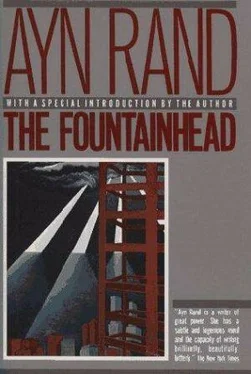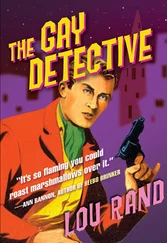The picture remained in their minds through the long legal discussions that followed. They heard the judge state to the prosecutor that the defendant had, in effect, changed his plea: he had admitted his act, but had not pleaded guilty of the crime; an issue of temporary legal insanity was raised; it was up to the jury to decide whether the defendant knew the nature and quality of his act, or, if he did, whether he knew that the act was wrong. The prosecutor raised no objection; there was an odd silence in the room; he felt certain that he had won his case already. He made his closing address. No one remembered what he said. The judge gave his instructions to the jury. The jury rose and left the courtroom.
People moved, preparing to depart, without haste, in expectation of many hours of waiting. Wynand, at the back of the room, and Dominique, in the front, sat without moving.
A bailiff stepped to Roark's side to escort him out Roark stood by the defense table. His eyes went to Dominique, then to Wynand. He turned and followed the bailiff.
He had reached the door when there was a sharp crack of sound, and a space of blank silence before people realized that it was a knock at the closed door of the jury room. The jury had reached a verdict.
Those who had been on their feet remained standing, frozen, until the judge returned to the bench. The jury filed into the courtroom.
"The prisoner will rise and face the jury," said the clerk of the court.
Howard Roark stepped forward and stood facing the jury. At the back of the room, Gail Wynand got up and stood also.
"Mr. Foreman, have you reached a verdict?"
"We have."
"What is your verdict?"
"Not guilty."
The first movement of Roark's head was not to look at the city in the window, at the judge or at Dominique. He looked at Wynand.
Wynand turned sharply and walked out. He was the first man to leave the courtroom.
ROGER ENRIGHT bought the site, the plans and the ruins of Cortlandt from the government. He ordered every twisted remnant of foundations dug out to leave a clean hole in the earth. He hired Howard Roark to rebuild the project. Placing a single contractor in charge, observing the strict economy of the plans, Enright budgeted the undertaking to set low rentals with a comfortable margin of profit for himself. No questions were to be asked about the income, occupation, children or diet of the future tenants; the project was open to anyone who wished to move in and pay the rent, whether he could afford a more expensive apartment elsewhere or not.
Late in August Gail Wynand was granted his divorce. The suit was not contested and Dominique was not present at the brief hearing. Wynand stood like a man facing a court-martial and heard the cold obscenity of legal language describing the breakfast in a house of Monadnock Valley — Mrs. Gail Wynand — Howard Roark; branding his wife as officially dishonored, granting him lawful sympathy, the status of injured innocence, and a paper that was his passport to freedom for all the years before him, and for all the silent evenings of those years.
Ellsworth Toohey won his case before the labor board. Wynand was ordered to reinstate him in his job.
That afternoon Wynand's secretary telephoned Toohey and told him that Mr. Wynand expected him back at work tonight, before nine o'clock. Toohey smiled, dropping the receiver.
Toohey smiled, entering the Banner Building that evening. He stopped in the city room. He waved to people, shook hands, made witty remarks about some current movies, and bore an air of guileless astonishment, as if he had been absent just since yesterday and could not understand why people greeted him in the manner of a triumphal homecoming.
Then he ambled on to his office. He stopped short. He knew, while stopping, that he must enter, must not show the jolt, and that he had shown it: Wynand stood in the open door of his office.
"Good evening, Mr. Toohey," said Wynand softly. "Come in."
"Hello, Mr. Wynand," said Toohey, his voice pleasant, reassured by feeling his face muscles manage a smile and his legs walking on.
He entered and stopped uncertainly. It was his own office, unchanged, with his typewriter and a stack of fresh paper on the desk. But the door remained open and Wynand stood there silently, leaning against the jamb.
"Sit down at your desk, Mr. Toohey. Go to work. We must comply with the law."
Toohey gave a gay little shrug of acquiescence, crossed the room and sat down. He put his hands on the desk surface, palms spread solidly, then dropped them to his lap. He reached for a pencil, examined its point and dropped it
Wynand lifted one wrist slowly to the level of his chest and held it still, the apex of a triangle made by his forearm and the long, drooping fingers of his hand; he was looking down at his wrist watch. He said:
"It is ten minutes to nine. You are back on your job, Mr. Toohey."
"And I'm happy as a kid to be back. Honestly, Mr. Wynand, I suppose I shouldn't confess it, but I missed this place like all hell."
Wynand made no movement to go. He stood, slouched as usual, his shoulder blades propped against the doorjamb, arms crossed on his chest, hands holding his elbows. A lamp with a square shade of green glass burned on the desk, but there was still daylight outside, streaks of tired brown on a lemon sky; the room held a dismal sense of evening in the illumination that seemed both premature and too feeble. The light made a puddle on the desk, but it could not shut out the brown, half-dissolved shapes of the street, and it could not reach the door to disarm Wynand's presence.
The lamp shade rattled faintly and Toohey felt the nimble under his shoe soles: the presses were rolling. He realized that he had heard them for some time. It was a comforting sound, dependable and alive. The pulse beat of a newspaper — the newspaper that transmits to men the pulse beat of the world. A long, even flow of separate drops, like marbles rolling away in a straight line, like the sound of a man's heart.
Toohey moved a pencil over a sheet of paper, until he realized that the sheet lay in the lamplight and Wynand could see the pencil making a water lily, a teapot and a bearded profile. He dropped the pencil and made a self-mocking sound with his lips. He opened a drawer and looked attentively at a pile of carbons and paper clips. He did not know what he could possibly be expected to do: one did not start writing a column just like that. He had wondered why he should be asked to resume his duties at nine o'clock in the evening, but he had supposed that it was Wynand's manner of softening surrender by overdoing it, and he had felt he could afford not to argue the point.
The presses were rolling; a man's heartbeats gathered and re-broadcast. He heard no other sound and he thought it was absurd to keep this up if Wynand had gone, but most inadvisable to look in his direction if he hadn't.
After a while he looked up. Wynand was still there. The light picked out two white spots of his figure: the long fingers of one hand closed over an elbow, and the high forehead. It was the forehead that Toohey wanted to see; no, there were no slanting ridges over the eyebrows. The eyes made two solid white ovals, faintly discernible in the angular shadows of the face. The ovals were directed at Toohey. But there was nothing in the face; no indication of purpose.
After a while, Toohey said:
"Really, Mr. Wynand, there's no reason why you and I can't get together."
Wynand did not answer.
Toohey picked up a sheet of paper and inserted it in the typewriter. He sat looking at the keys, holding his chin between two fingers, in the pose he knew he assumed when preparing to attack a paragraph. The rims of the keys glittered under the lamps, rings of bright nickel suspended in the dim room.
Читать дальше










